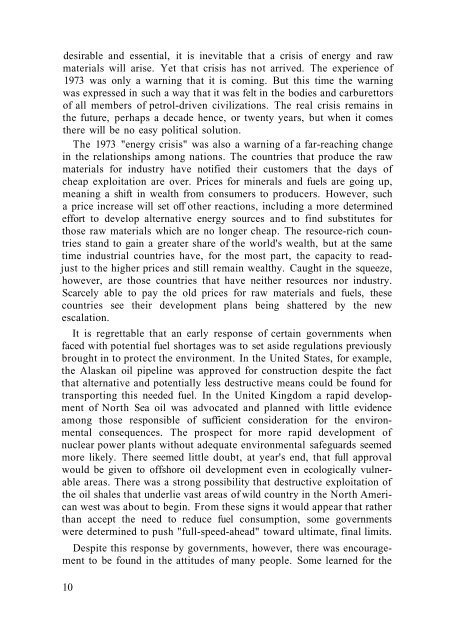1973 iucn yearbook
1973 iucn yearbook
1973 iucn yearbook
Create successful ePaper yourself
Turn your PDF publications into a flip-book with our unique Google optimized e-Paper software.
desirable and essential, it is inevitable that a crisis of energy and raw<br />
materials will arise. Yet that crisis has not arrived. The experience of<br />
<strong>1973</strong> was only a warning that it is coming. But this time the warning<br />
was expressed in such a way that it was felt in the bodies and carburettors<br />
of all members of petrol-driven civilizations. The real crisis remains in<br />
the future, perhaps a decade hence, or twenty years, but when it comes<br />
there will be no easy political solution.<br />
The <strong>1973</strong> "energy crisis" was also a warning of a far-reaching change<br />
in the relationships among nations. The countries that produce the raw<br />
materials for industry have notified their customers that the days of<br />
cheap exploitation are over. Prices for minerals and fuels are going up,<br />
meaning a shift in wealth from consumers to producers. However, such<br />
a price increase will set off other reactions, including a more determined<br />
effort to develop alternative energy sources and to find substitutes for<br />
those raw materials which are no longer cheap. The resource-rich countries<br />
stand to gain a greater share of the world's wealth, but at the same<br />
time industrial countries have, for the most part, the capacity to readjust<br />
to the higher prices and still remain wealthy. Caught in the squeeze,<br />
however, are those countries that have neither resources nor industry.<br />
Scarcely able to pay the old prices for raw materials and fuels, these<br />
countries see their development plans being shattered by the new<br />
escalation.<br />
It is regrettable that an early response of certain governments when<br />
faced with potential fuel shortages was to set aside regulations previously<br />
brought in to protect the environment. In the United States, for example,<br />
the Alaskan oil pipeline was approved for construction despite the fact<br />
that alternative and potentially less destructive means could be found for<br />
transporting this needed fuel. In the United Kingdom a rapid development<br />
of North Sea oil was advocated and planned with little evidence<br />
among those responsible of sufficient consideration for the environmental<br />
consequences. The prospect for more rapid development of<br />
nuclear power plants without adequate environmental safeguards seemed<br />
more likely. There seemed little doubt, at year's end, that full approval<br />
would be given to offshore oil development even in ecologically vulnerable<br />
areas. There was a strong possibility that destructive exploitation of<br />
the oil shales that underlie vast areas of wild country in the North American<br />
west was about to begin. From these signs it would appear that rather<br />
than accept the need to reduce fuel consumption, some governments<br />
were determined to push "full-speed-ahead" toward ultimate, final limits.<br />
Despite this response by governments, however, there was encouragement<br />
to be found in the attitudes of many people. Some learned for the<br />
10

















